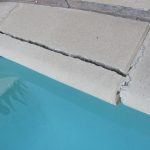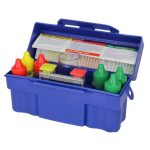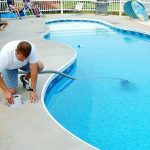Regular cleaning is essential to maintaining a commercial pool, keeping it safe, clear, and enjoyable for users. Commercial pool cleaning not only does it ensure a good swimming experience, but it also helps meet safety standards and prevents issues that could harm both the pool and its users.
Why Is Commercial Pool Cleaning Important?
Keeping your pool clean is more than just about appearance. Dirty pools can pose serious health risks, such as skin rashes, eye irritation, or even more severe illnesses due to bacteria like E. coli. Regular cleaning keeps the water clear, prevents algae growth, and ensures the pool equipment functions properly. It also helps meet local health and safety standards, which can prevent fines or pool closures.
Key Factors That Affect Cleaning Frequency
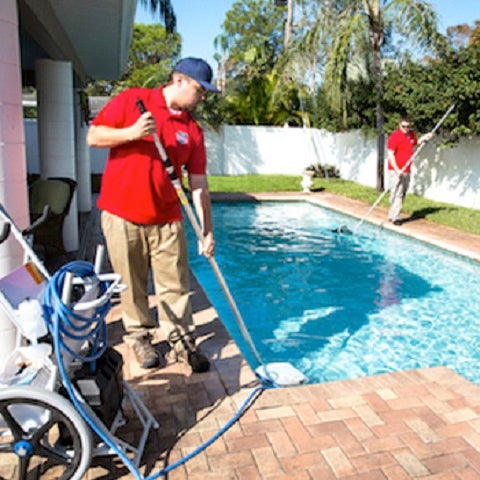
There are several factors that affect how often a commercial pool needs to be cleaned. Let’s break them down:
1. Pool Usage
The more a pool is used, the more often it needs cleaning. Pools that cater to large groups, such as gyms or hotels, tend to accumulate more dirt, oils, and debris. High traffic can cause faster contamination in the pool water. Therefore, daily cleaning tasks are crucial for these pools to keep them sanitary.
2. Pool Size and Water Volume
A larger pool holds more water but requires more time and equipment to clean. Smaller pools might seem easier to maintain, but dirt can accumulate faster due to the smaller volume of water. Both large and small pools need specific maintenance schedules that match their size.
3. Location: Indoor vs. Outdoor Pools
- Indoor Pools: Typically face fewer issues with leaves and debris but still require regular cleaning to manage oils, sweat, and bacteria from users.
- Outdoor Pools: These pools are exposed to the elements. They tend to gather more debris, like leaves and dirt, especially during windy weather. Outdoor pools also face greater exposure to sunlight, which can increase algae growth if the water isn’t properly maintained.
4. Local Regulations and Compliance
Health and safety regulations often dictate how frequently pools need to be cleaned. Many states or regions require pools to meet specific water quality standards, such as acceptable chlorine levels or pH balance. Failing to meet these standards can result in fines or even forced closure of the pool until it is compliant again.
How Often Should You Clean a Commercial Pool?

Cleaning a commercial pool depends on several factors, but here’s a guide to the basic cleaning routines:
Daily Cleaning
Daily cleaning is the foundation of pool maintenance. It focuses on quick tasks that prevent major issues from arising:
- Skimming the Pool Surface: This is the first line of defense against debris. Skimming removes leaves, insects, and other items that float on the surface.
- Chemical Testing and Adjustment: Regularly test the pool’s water to ensure it is properly balanced in terms of chlorine, pH, and alkalinity. Adjusting the chemicals daily ensures the water is safe for swimmers.
- Clean High-Touch Areas: Areas like pool ladders, railings, and steps are often touched by swimmers. Wiping them down regularly helps prevent the spread of bacteria.
Weekly Cleaning
Weekly cleaning involves more intensive tasks to ensure the pool stays clear of dirt and contaminants:
- Brushing Pool Walls and Tiles: Algae, dirt, and bacteria can build up along the pool’s walls and tiles. Brushing these areas once a week helps remove buildup and prevent staining.
- Vacuuming the Pool: Vacuuming the pool floor helps remove dirt, debris, and bacteria that sink to the bottom, especially in deeper pools where the water flow is minimal.
- Filter and Pump Inspection: Checking the filters and pumps regularly helps ensure they’re working efficiently. Dirty filters can impact the pool’s water quality and increase maintenance costs over time.
Monthly Cleaning
Every month, the pool requires deeper cleaning to keep everything running smoothly:
- Backwashing or Cleaning Filters: Backwashing involves reversing the flow of water through the pool’s filter to clean out debris and contaminants. It’s important to clean or replace filters monthly to ensure efficient filtration.
- Shocking the Pool: Shocking the pool means adding a large dose of chemicals to quickly raise chlorine levels and kill bacteria and algae. This is especially necessary after heavy pool use or to combat cloudy water.
- Equipment Inspections: Monthly maintenance is the best time to check on equipment such as heaters, pumps, and lighting to ensure they’re functioning properly and don’t need repairs.
Seasonal Cleaning
Outdoor pools need additional care at the beginning and end of each season. Seasonal maintenance ensures the pool is ready for the summer months and well-prepared for winter storage.
- Opening the Pool for the Season: This involves thoroughly cleaning the pool and equipment, adjusting chemical levels, and ensuring that everything is in working order before opening the pool for use.
- Closing the Pool for Winter: If the pool isn’t used in the colder months, it’s important to winterize it to prevent damage from freezing temperatures. This includes draining water from pipes, adding winterizing chemicals, and covering the pool.
Tools and Equipment for Commercial Pool Cleaning
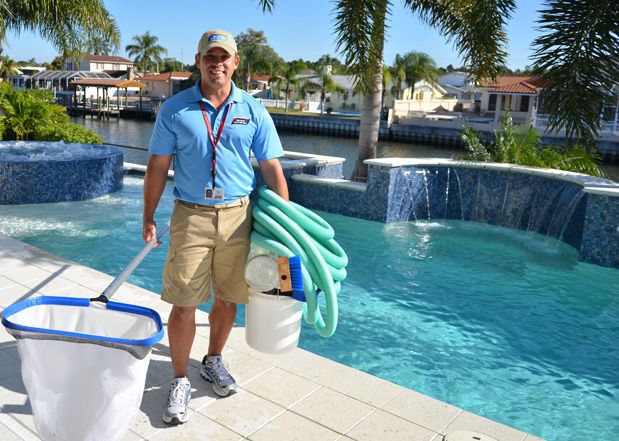
Cleaning a commercial pool requires a few key tools. Here’s what you need:
Skimmers
A pool cleaning service used to remove debris from the water’s surface. This can include leaves, bugs, or other objects that float.
Pool Vacuums
Manual or automatic vacuums help clean the pool floor, removing dirt that has sunk to the bottom.
Water Testing Kits
These kits help pool owners regularly test water quality and adjust chemical levels. Ensuring the right balance prevents bacteria buildup and keeps the pool water safe.
Pool Brushes
Used for scrubbing the walls and tiles of the pool to remove algae and other buildup that may affect the pool’s hygiene.
Chemical Solutions
Chlorine, algaecides, and pH balancers are used to keep the water clean, clear, and safe for swimmers.
Benefits of Regular Commercial Pool Cleaning
Here’s why regular cleaning is crucial for commercial pools:
Health and Safety
A clean pool reduces the risk of waterborne illnesses, skin rashes, and eye irritation. Proper chemical balancing and filtration ensure the water remains safe for users.
Cost-Effectiveness
Regular cleaning can help prevent major issues like algae growth or equipment failure, which can be costly to fix. Keeping up with small repairs and maintenance helps avoid expensive replacements in the future. And always contact to a swimming pool cleaning service professional for your peace of mind.
Pool Longevity
A well-maintained pool lasts longer. Routine cleaning prevents surface damage and reduces wear on pool equipment, extending the life of both the pool and its components.
The Cost of Professional Pool Cleaning Services
While DIY cleaning is possible for some tasks, hiring professional cleaners can be a more efficient and effective solution, especially for larger commercial pools. The cost of professional cleaning varies depending on the pool’s size, the services required, and how often the pool needs cleaning.
On average, professional cleaning services can range from $100 to $500 per month. For larger or more complex pools, the cost could be higher. Hiring professionals ensures consistent, high-quality cleaning, which can prevent problems before they become expensive.
Conclusion
Cleaning a commercial pool is an ongoing responsibility that requires attention to detail. By following regular cleaning schedules and using the right tools, you can ensure that your pool remains a safe, clean, and inviting place for everyone. Whether you handle the cleaning yourself or hire professionals, consistency is key. A well-maintained pool is not just about looks—it’s about creating a safe environment for all users.




